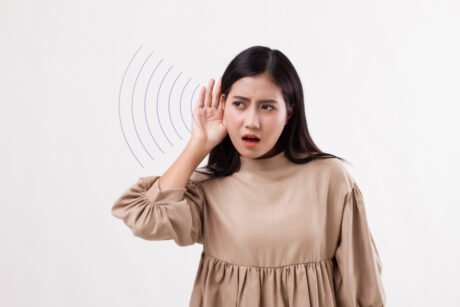Did you know that hearing loss is a common condition? It often creeps in so gradually that many people don’t realise they have a problem until it significantly impacts their daily lives. You might associate hearing difficulties primarily with older age, but the truth is that hearing changes can happen to anyone at any stage of life. Dismissing early signs is easy, perhaps attributing them to others’ mumbling or background noise. However, detecting hearing loss early through a professional hearing test and ear check-up in Singapore is crucial. Early acknowledgement leads to better management options, helping you maintain clearer communication, stronger relationships, and overall cognitive well-being for years to come.
At Listening Lab SG, we believe proactive hearing care is essential. This guide will help you recognise some often-overlooked indicators that it might be time for a hearing assessment.
Common Signs You Might Be Missing
It’s easy to adapt to subtle changes in your hearing without consciously noticing. However, these common situations might be clues that your hearing isn’t what it used to be:
- Constantly Turning Up the TV Volume: Do family members or friends often comment that your television or radio is too loud? Do you find yourself increasingly reliant on subtitles to follow the dialogue, even when the volume seems high to others? This can be a classic sign.
- Difficulty Hearing in Noisy Places: While it’s normal for anyone to find it harder to hear in a bustling environment, a consistent struggle to follow conversations in restaurants, cafes, at social gatherings in Singapore, or during meetings could indicate an underlying hearing issue. You might find yourself concentrating intensely but still missing parts of what’s said.
- Frequently Asking Others to Repeat Themselves: Are phrases like “What did you say?” or “Could you repeat that, please?” becoming a regular part of your conversations, even in quieter settings? If you often feel like people are mumbling or not speaking clearly, it might be your hearing that needs attention.
- Feeling Tired After Conversations: Straining to hear and understand speech, especially over extended periods or in challenging listening environments, can be surprisingly mentally fatiguing. If you consistently feel exhausted after social interactions or long meetings, it could be due to the extra effort your brain is exerting to process sound.
Recognising these signs is an important first step in considering when you should take a hearing test.
Hearing Loss vs. Other Issues
It’s important to note that not every instance of muffled hearing or difficulty understanding points directly to permanent hearing loss. Several other common ear issues can present with similar symptoms, and it’s vital to differentiate them:
- Earwax Buildup (Cerumen Impaction): Earwax is a natural substance that protects your ear canal. However, sometimes it can accumulate and become impacted, leading to symptoms like a feeling of fullness in the ear, suddenly muffled or reduced hearing, tinnitus (a ringing or buzzing sound), mild dizziness, or even an earache. This condition is often temporary and can usually be resolved with safe, professional earwax removal.
- Ear Infections (e.g., Otitis Media, Otitis Externa): Infections in the middle ear (otitis media) or outer ear canal (otitis externa, or swimmer’s ear) can also significantly affect your hearing. Symptoms often include ear pain (which can be severe), a feeling of pressure or blockage, discharge from the ear, fever, and muffled or decreased hearing. Dizziness can sometimes accompany middle ear infections. These conditions require medical attention and often treatment with antibiotics or other medications.
- Actual Hearing Loss (Sensorineural or Conductive): This type of hearing loss is typically more persistent and doesn’t resolve on its own like an earwax blockage or an acute infection might. It can be conductive (problems with the outer or middle ear conducting sound) or sensorineural (damage to the inner ear or auditory nerve). The common signs that were mentioned, such as hearing difficulty in noisy places, needing repetitions, and struggling with the clarity of speech, are often indicative of this. It may affect certain pitches or sounds more than others.
While some symptoms clearly point towards an infection (like pain and fever), others, such as muffled hearing or tinnitus, can overlap across all three conditions. Relying on an online hearing test might give you a very basic indication of sound detection, but it cannot diagnose the cause of your hearing difficulty or differentiate between earwax, an infection, or true hearing loss.
The only reliable way to understand what’s happening is through a comprehensive ear check-up and a diagnostic hearing test in Singapore conducted by a qualified audiologist specialist. At a hearing diagnostic center like Listening Lab, our specialists use professional equipment and techniques to examine your ear canal and middle ear health, as well as precisely measure your hearing thresholds. This allows us to differentiate between these conditions and recommend the appropriate course of action.
When to Get a Professional Hearing Test
Beyond the everyday signs, certain factors increase the likelihood of hearing changes and warrant a proactive approach to getting a professional hearing assessment:
- Age-Related Risk Factors: While not inevitable, the incidence of hearing loss increases with age. It’s generally recommended that adults over 50 consider regular hearing evaluations as part of their health routine.
- Exposure to Loud Noise: Prolonged or repeated exposure to loud sounds is a major contributor to hearing loss. This includes noise in the workplace (e.g., construction, manufacturing, even loud office environments) and recreational noise (such as concerts, motorsports, or frequent use of personal audio devices at high volumes). If you have a history of significant noise exposure, a hearing test is advisable.
- Family History: If hearing loss runs in your family, you may have a genetic predisposition, making regular checks more important.
- Specific Medical Conditions or Medications: Certain illnesses (like diabetes or cardiovascular disease) and some medications (known as ototoxic drugs) can impact hearing.
- Experiencing Tinnitus: Persistent ringing, buzzing, or hissing in your ears (tinnitus) can be associated with underlying hearing loss.
- Sudden Changes in Hearing: Any sudden drop in your ability to hear, in one or both ears, should be evaluated urgently.
Understanding when to take a hearing test can empower you to take control of your auditory health.
What to Expect During a Hearing Test
If you’ve never had a professional hearing test, you might feel a little apprehensive. However, it’s a completely painless, non-invasive, and straightforward process. At Listening Lab, a hearing test conducted by our audiologist specialist involves several steps:
- Initial Consultation & History: We’ll start by discussing your hearing concerns, medical history, lifestyle, and any specific situations where you find hearing difficult.
- Otoscopy: Your audiologist will gently examine your outer ear and ear canal using an otoscope (a special magnifying light) to check for any blockages like earwax, signs of infection, or other physical issues.
- Pure-Tone Audiometry: This is the part most people associate with a hearing test. You’ll sit in a sound-treated booth wearing headphones and will be asked to respond (usually by pressing a button) when you hear a series of beeps or tones at different pitches and volumes. This helps determine the softest sounds you can hear across the frequency spectrum for each ear. For younger children, whose attention and responses differ, our audiologist specialist adapts the testing method using engaging, age-appropriate techniques such as conditioned play audiometry, where responses to sounds are encouraged through fun play activities.
- Speech Audiometry (if needed): You might also be asked to listen to and repeat words spoken at different loudness levels, sometimes with background noise. This helps assess how well you understand speech.
The results of your pure-tone test are plotted on a graph called an audiogram. This audiogram provides a visual representation of your hearing ability, revealing the type, degree, and configuration of any hearing loss. Your audiologist will explain these results to you clearly, discussing what they mean for your communication and what options are available if a hearing loss is detected.
Don’t Wait for It to Get Worse

Hearing is a vital sense that connects us to the world and the people around us. Ignoring the early signs of hearing loss can lead to increased communication difficulties, social withdrawal, and even impact your cognitive health over time. Just as you’d have regular check-ups for your eyes or teeth, an ear check-up and a periodic hearing test should be part of your proactive approach to overall wellness.
If any of the signs discussed in this article resonate with you, or if you have concerns about your hearing for any reason, don’t wait for things to potentially get worse. Taking action early can lead to more effective solutions and help you continue to enjoy all the sounds of life in Singapore.
Ready to understand your hearing better? We encourage you to book a comprehensive hearing test in Singapore with an experienced audiologist specialist at Listening Lab Singapore today. Taking this simple step is an investment in your long-term hearing health and quality of life.










